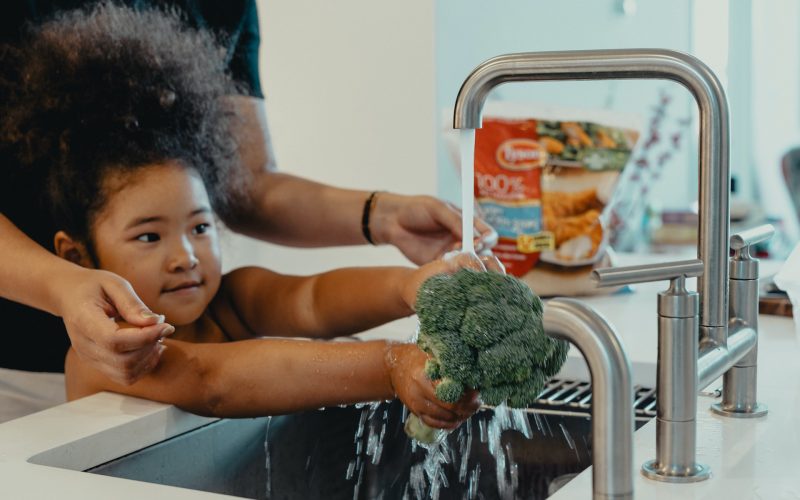Table of Contents
- Why age-appropriate chores for kids are vital for 4 – 5-year-olds
- How to encourage school-age kids to do their chores
- How to develop discipline in 8 – 9-year-olds using age-appropriate chores
- How to get pre-teens to help around the house
- Do teenagers still need to do chores?
- Age-appropriate chores for kids are parents’ secret weapons
When my son was 3 years old, he liked to put everything in his mouth, from earthworms to our dogs’ paws. So when it was time for us to give him chores, his first one was to “Stop yourself from putting non-food things in your mouth.” Talk about age-appropriate chores for kids. That one was unapologetically suited for a three-year-old.
As our kids grew, so did their list of chores. And, boy, was it a struggle sometimes to be consistent with handing down consequences for undone chores. We also found it difficult to motivate them to complete chores.
At one time, my husband and I considered paying our kids to wash the dishes and feed the dogs. But child psychologists are one in saying that paying children to do chores is a bad idea. It teaches them that hard work is transactional; that if you want them to do something, you’ll have to offer them something in return first.
This is not the value you want to teach your child. Doing chores builds self-confidence, resilience, independence, and pride in oneself. The motivation should not be monetary.
Finally, we realized the secret was in communicating our expectations and helping our kids work their chores into their daily and weekly routines. Below, you’ll find chores for kids by age. Hopefully these checklists can help your child get their chores done.
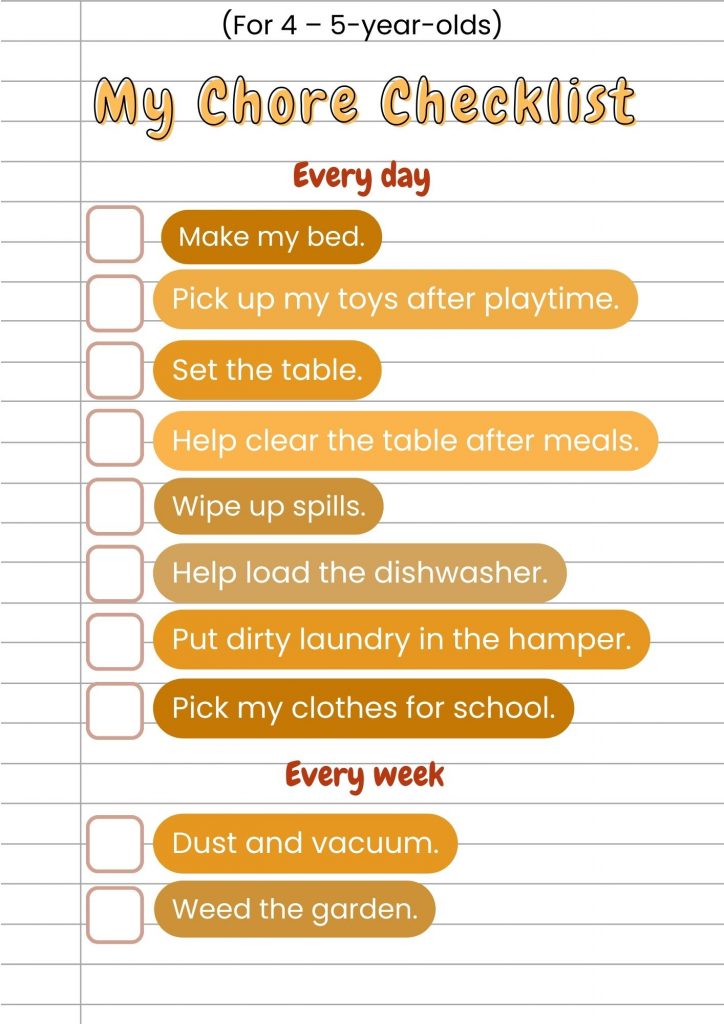
Why age-appropriate chores for kids are vital for 4 – 5-year-olds
Children at pre-school age (3 – 4 years old) are starting to explore a wider range of emotions. They are more in control of their behavior and, generally, have fewer tantrums. Kids this age learn through play; that’s why having enough playtime is crucial to their development.
Pre-schoolers are excited to help. They feel important when they’re given tasks to do in the house along with everyone else. They love being active and are trying to master the art of dressing themselves.
The age-appropriate chores for kids that you assign to your pre-schooler should be simple and easy to do. You need to supervise them on everything. Also, be understanding when they get distracted or forget about their chores. The key is to consistently and patiently work these chores into their routine.
Remember that your objective in assigning your pre-schooler household tasks is not really to make the house clean or ease your work in the kitchen. It’s to ingrain in them a sense of pride in completing a task, which boosts their self-confidence.
Daily chores for 4 – 5-year-olds:
Make the bed. It doesn’t have to be perfect. Let them to just straighten up their pillows and, with your help, fold their blanket. This practice, if done consistently, can actually change your child’s life. Naval Admiral William H. McRaven, in his commencement speech at the University of Texas, shares just how important it is to develop this habit. (His tribute to bed-making starts at the 4:44 mark.)
Pick up toys after playtime. Have a basket in every room where your child plays. At the end of every playtime, encourage them to toss their toys into the basket. This makes clean-up time so much easier.
Set the table. You could help with the plates and drinking glasses if they’re heavy. But leave your child to do the rest. This daily routine will eventually signify the start of a family meal, solidifying, in your child’s mind, its importance.
Help clear the table after meals. Cleaning up after yourself is a vital skill in adulthood. So start your child early. Let them bring their plate to the sink and help put away leftovers.
Wipe up spills. If they spill something, let them take a rag and immediately wipe up the mess. This will teach your child two things: to take care of their own mess, and to deal with it as soon as possible.
Help load the dishwasher. The simple act of clearing plates and utensils and properly placing them in the dishwasher is important.
Put dirty laundry in the hamper. You don’t want to be the parent whose child leaves wet towels and dirty clothes all over the bathroom floor.
Pick clothes for school the next day. By getting their school clothes ready the night before, your child learns the value of preparation.
Weekly chores for 4 – 5-year-olds:
Dust and vacuum. Once a week, guide your child in running the vacuum cleaner and wiping surfaces with a rag.
Pull weeds in the garden. If you don’t have a garden, remove dead leaves from indoor plants. This chore presents a twofold benefit. It takes care of your plants, but more importantly, there are microorganisms in soil that can boost your child’s immune system.
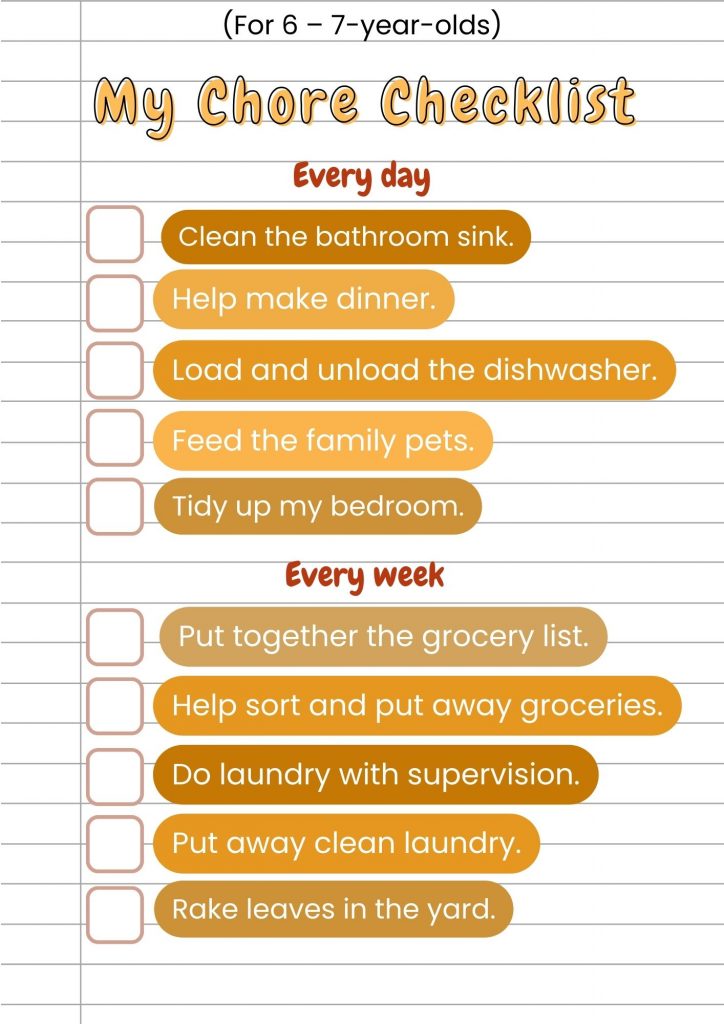
How to encourage school-age kids to do their chores
When they start going to school, children gradually get exposed to the outside world. Having friends becomes more important to them. So is having a feeling of independence from their family. Physical, social, emotional, and mental development is speeding along.
It’s important to observe your child as they do chores. Which tasks are easy for them? Which ones present a challenge? Adjust their chores (the frequency or your expectations) depending on what you see. By giving them tasks that build on their strengths and improve on their weaknesses, you are essentially equipping your child with the tools they need for their growth and development.
“But in the real world, their tasks won’t be adjusted at all,” you may argue. That’s true. This is why it’s important to be supportive and build your child’s skills while they’re young. It will put them in a growth mindset, which, in turn, will help them face any obstacle with determination.
Daily chores for 6 – 7-year-olds
Clean the bathroom sink. Have a cleaning bin in every bathroom. Keep it stocked with gloves, a cleaning solution (that’s safe for children), and a sponge.
Help make dinner. This list will give you an idea of which age-appropriate tasks are best for your little kitchen helper.
Load and unload the dishwasher. Unloading the dishwasher is equally important as loading it. This task will teach your child where utensils, plates, and glasses are stored in the kitchen.
Feed family pets. This chore will establish time-management (and time-telling) skills in your child. Your child has to make sure your pets are fed at the same time every day.
Tidy up the bedroom. Aside from making their bed, your child can also pick up stuff from the floor.
Weekly chores for 6 – 7-year-olds
Put together a grocery list. Hang a clipboard on an accessible spot in the kitchen. Let your child write on it food items that they use up. It practices their handwriting and makes them more mindful of the family’s needs.
Help sort and put away groceries. Everyone should be familiar with where everything is stored in the kitchen.
Do laundry with supervision. Let your child separate the whites from the colored clothes. Teach them where the detergent goes, and which settings to use to run a load of laundry.
Fold and put away clean laundry. Washing clothes doesn’t end at tossing them in the washing machine. The clothes also have to be folded and put away. The earlier you ingrain this in your child, the easier time they’ll have as adults dealing with clean but unfolded laundry.
Rake leaves in the yard. Exposure to sunlight is vital for everyone, especially your child, whose immune system is still developing. Also, being in nature is essential to your child’s growth.
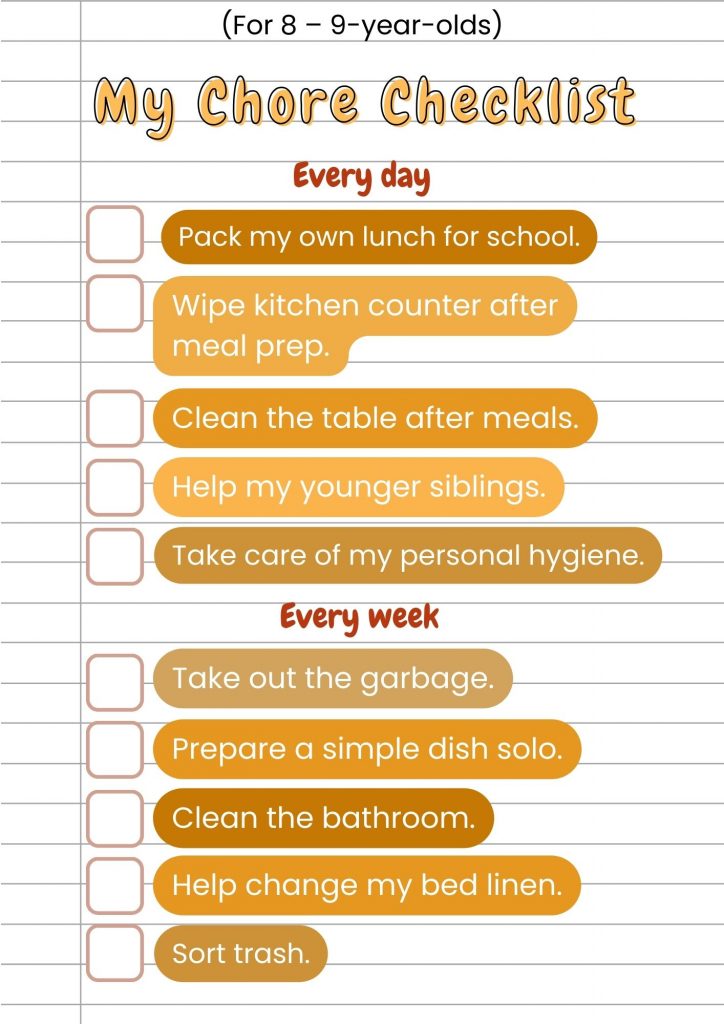
How to develop discipline in 8 – 9-year-olds using age-appropriate chores
Setting personal goals—and achieving them—is important to the development of a child’s self-discipline. Use chores as an example of goal-setting.
Until my son was around 8, he only had two daily chores: make his bed in the morning and feed our dogs after school. My husband and I felt he needed to do more to help around the house.
So we added one other chore. As he was a picky eater, we told him he needed to learn how to cook the food that he likes to eat. I wrote down the recipe for his favorite pasta dish and we worked on it every week. His goal was to master one step per week. On the first week, he learned how to cook al dente pasta. On the second week, my son learned how to mince garlic, onion, and parsley. And so on. It took two months for our son to learn how to cook his favorite dish perfectly, but he kept at it, and finally mastered it.
It was amazing watching him set goals for himself and remain disciplined to achieve them. I think I was happier than he was when he finally got the dish right.
Daily chores for 8 – 9 year-olds
Pack their own lunch for school. Mornings are stressful enough as it is. So delegate their own school lunch prep to each child. (But oversee this task so they don’t pack just a donut or twinkies.)
Wipe down the kitchen counter after meal prep. It’s not uncommon to see the acronym “CLAYGO” posted on cafeteria walls. The Clean As You Go policy is standard practice in the food industry. Let it be the same in your home.
Take charge of their personal hygiene. But this age, you shouldn’t have to be reminding your child to brush their teeth after every meal.
Help their younger siblings, if they have any, with dressing up. Not only will this make getting ready easier; it will also strengthen the bond between siblings.
Wipe down the dining table after meals. Teach your child that cleanliness is important in a healthy household.
Weekly chores for 8 – 9-year-olds
Take out the garbage. If it’s safe to do so by themselves, that is.
Prepare a simple dish solo. Perhaps one dish for Sunday lunch can be prepared by the kids? These recipes are simple, delicious, and easy for kids to do by themselves.
Clean certain areas in the bathroom. Aside from the sink, let them pick something else to clean, such as the tub/shower, floor, mirror, or toilet.
Help change bed linen. Let your child help with every step: stripping the mattress, changing pillowcases and sheets, tucking in the top sheet and placing the duvet over everything.
Sort trash into general waste and recyclables. Take this opportunity to also teach your child the importance of recycling and taking care of our planet by minimizing our trash.
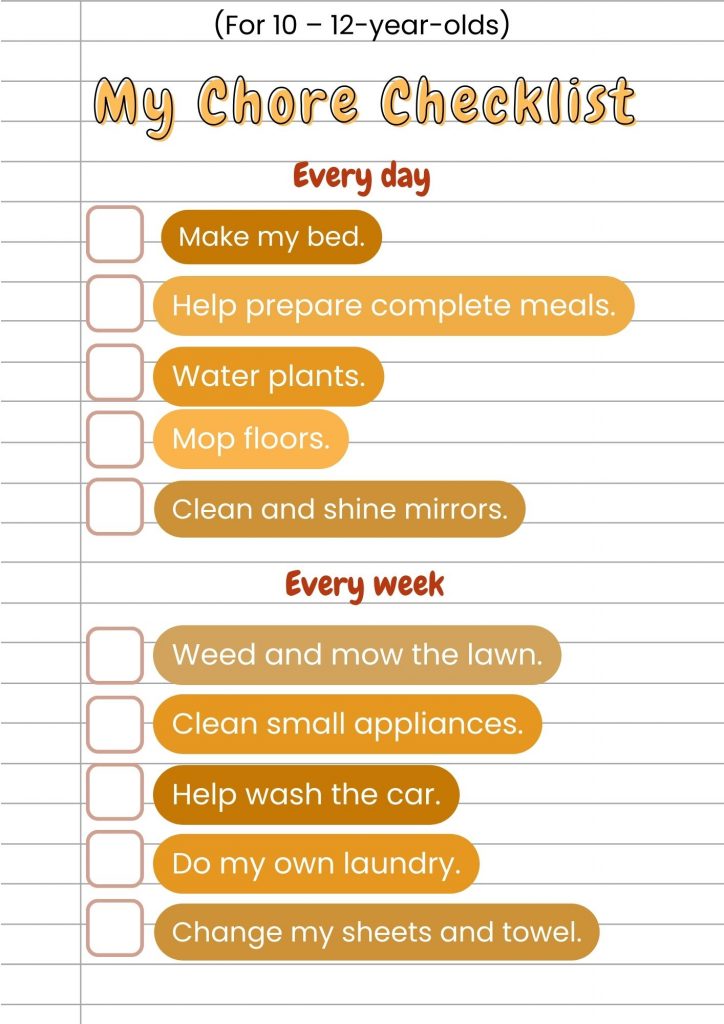
How to get pre-teens to help around the house
Because they’re at the precipice of teen-hood, pre-teens value their independence like gold. There is nothing more precious. So if you want to upgrade their chores, the first step is to hold a consultation with your child.
Give them a list of age-appropriate chores that you’d like them to do. Let them pick which ones they want to do. Then agree on the frequency. Most importantly, lay down your expectations and the consequences if these aren’t met.
Now, sometimes, your pre-teen may slack off of doing their chores; perhaps because of beckoning friends, perhaps because of life getting in the way.
When this happens, your first instinct might be to punish. Hold off on that, mom and dad. Count to 10, take a deep breath, and then investigate why a chore wasn’t done. Connect with your child instead of punishing them for not doing a chore.
Also, encourage them. But go beyond the usual, “Good job,” and, “Way to go.” Focus, instead, on how they accomplish their chores. Say, “How clean is this bathroom?! You worked so hard. I’m proud of you.” Or, “That meal you cooked was delicious. Thank you!”
Use chores to build up your child’s self-esteem, not to bring it down.
Daily chores for 10 – 12-year-olds
Make their bed. Let your child know that they are expected to make their bed every morning without prompting or supervision.
Help prepare complete meals. Once they master cooking one dish—their signature dish—let them graduate to preparing one complete meal with supervision. This will teach them how to plan, cook, and serve a balanced meal.
Water plants. If your child has a green thumb, they’ll appreciate learning about the different needs of different plants.
Mop floors. And after mopping, teach them how to clean the mop.
Clean and shine mirrors. This requires a gentle but firm touch. You don’t want to be too heavy-handed because you might break the mirror. At the same time, you can’t wipe too lightly because that won’t remove all the smudges.
Weekly chores for 10 – 12-year-olds
Weed and mow the lawn. Be around, though, when they mow. Make sure to teach them the safety settings of the mower, as well as how to do it correctly and safely.
Clean small appliances (under supervision), like microwave ovens and refrigerator drawers. A damp cloth, dish soap, some baking soda, and elbow grease can do the trick. If you need more guidance, let Martha Stewart give you some.
Help wash the car. This could even end up in a water gun fight if you’re lucky.
Do their own laundry. A self-sufficient adult begins as a self-sufficient child who knows how to do their own laundry.
Change their bedsheets and towel by themselves. Without prompting or supervision, teach your child to handle their bed linen and towels themselves.
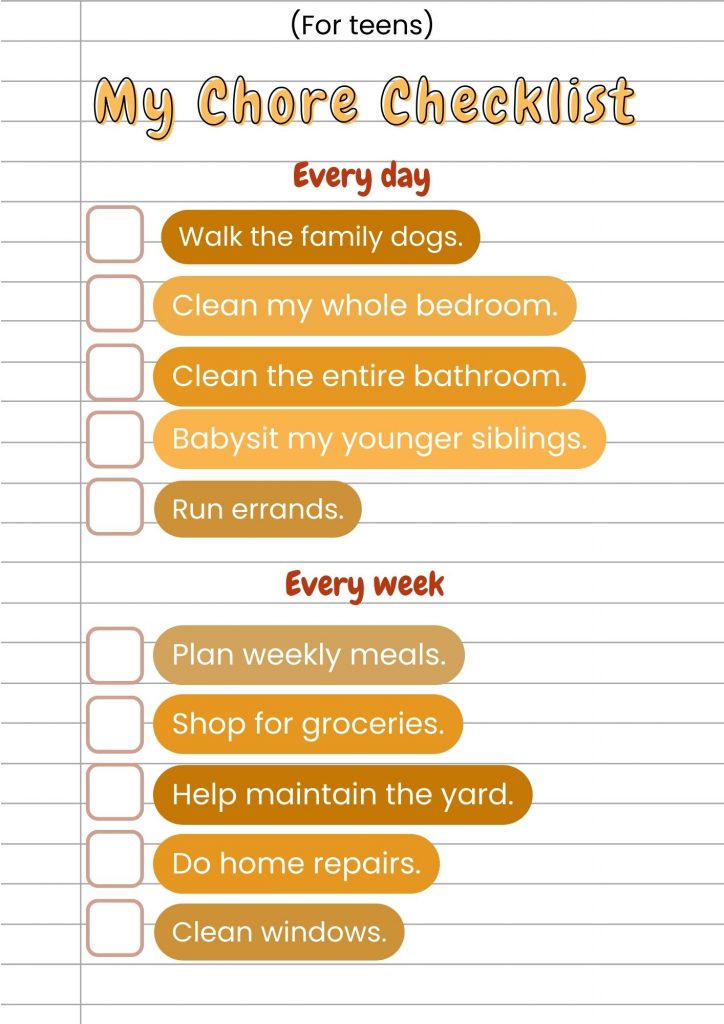
Do teenagers still need to do chores?
Of course, they do. Age-appropriate chores for kids are one way to teach teenagers about responsibility while they’re still dependent on you. Unfortunately, it’s not always easy to get teens to help around the house. So this is what you can do, mom and dad.
First, remember to assign chores ahead of time. (The chore checklist below will help with that.) Spontaneously asking your teen to do the dishes while they’re settling down in front of the TV will, most probably, result in an argument. If, however, your teen knows that they’re expected to wash the dinner dishes every day, then they can work it into their routine, albeit begrudgingly.
Second, give your teen some flexibility. If one of their chores is to walk the dogs, let them pick the time to do it. Give your teen some control over how they do their chores.
Third, use the “if-then” method to clearly lay down consequences. “If you don’t clean the kitchen after dinner, then there will be no wifi for you tomorrow.” Remind your teen once about their chore. If it remains undone, then consistently follow through with your consequence. Doing so will teach your child that if they want to keep their privileges, they need to do their chores.
Your teenager is a good kid. They just need a few pushes—i.e., chores—so they go down the right path.
Daily chores for teenagers
Walk the family dogs. Human-animal interactions bring a host of health benefits to both humans and animals. These include developing compassion and responsibility in the animals’ carers; i.e., your child.
Clean their whole bedroom. Now that they’re teens, it shouldn’t be enough that they make their bed in the morning. A clean, clutter-free bedroom makes for a clean, clutter-free mind and soul.
Clean their bathroom, including the toilet and floor. The bathroom is a hotspot for bacteria. Spot cleaning it every day removes the bigger, more daunting task of intense cleaning every month.
Babysit younger siblings, if any. If teenagers are given more age-appropriate responsibilities, they get more opportunities to develop their self-confidence and resilience, and practice their problem-solving skills.
Run errands. Ran out of milk? Need to buy something for a school project at the last minute? Send your teen.
Weekly chores for teenagers
Plan weekly meals. This chore can show your teen what it takes to feed an entire family every week. Give them a budget to work with and see how they strategize to make it fit. Find free printable weekly meal planners here.
Shop for groceries without supervision. Aside from freeing you up to do other tasks, shopping for groceries can teach your teen how to stay within a budget. They can also learn how to compare prices and brands.
Clean windows. Unless they’re too young or medically incapable, no one in the household should be spared drudgery work. Let everyone learn the value of simple elbow grease.
Help maintain the yard. Trim the hedges, rake the leaves, supervise younger siblings in maintaining plants—there are plenty of tasks for a teenager to do in the yard.
Do basic home maintenance and repairs. When they’re living on their own, they will have to be their own personal handyman. Let them learn the basics at home, such as changing lightbulbs and doing simple plumbing repairs.
Age-appropriate chores for kids are parents’ secret weapons
When you give your child chores to do, they may see it as unnecessary suffering, and act accordingly. But since you know that doing chores will help in your child’s physical, mental, emotional, and social development, you keep at it. As long as you give age-appropriate chores for kids, there should be no regrets.
We’re eager to know: what chores do you give your child? Care to share?
Like this post? Click on the image below to save it for later! – Thank you!








